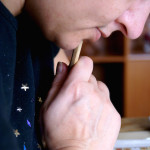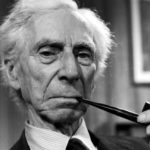What Life is Like When you Are not Alive
by Dr. Dennis Bonnette
Filed under Anthropology

Ever wonder what it is like to be in the next life, that is, to be dead? (I thought it best to leave the word “dead” out of the title of this essay.) Since this is something we all must face sooner or later, I thought it might be of interest to engage in some rational speculation about what a human being experiences, if anything, after he becomes unconscious for the last time.
This is not a theological enquiry. So, depictions of hellfire and eternal bliss, though they may be apologetically defensible, are not where this essay is going. Rather, I shall explore what natural reason might tell us about afterlife possibilities.
Now one can make the rather impertinent observation some have offered about the curious situation of the atheist at his own funeral: “All dressed up and nowhere to go.” That is, after all, the ultimate implication of most forms of skepticism, materialism, and atheism.
Reincarnation, or, Getting Another Bite at the Apple
On the other hand, we have the doctrine of metempsychosis or reincarnation offered by both the Vedic tradition in the east and Plato in the west. In that view, dying is followed by birth into another life. Plato, in his dialogue, the Timaeus, expresses his own version of metempsychosis, when he postulates that the form of life we reenter depends on how we live this present life.
“He who lived well during his appointed time was to return and dwell in his native star, and there he would have a blessed and congenial existence. But if he failed in attaining this, at the second birth he would pass into a woman, and if, when in that state of being, he did not desist from evil, he would continually be changed into some brute who resembled him in the evil nature which he had acquired, and would not cease from his toils and transformations until he followed the revolution of the same and the like within him, and overcame by the help of reason the turbulent and irrational mob of later accretions, made up of fire and air and water and earth, and returned to the form of his first and better state.”1
Prescinding from Plato’s speculation about moving down and back up the ladder of living things and since we presently know what it is to experience our own human life, it is not all that difficult to imagine reentering the same kind of life we presently have.
Death Without Continuous Reincarnation
Far more intriguing is the prospect of trying to imagine what it is like to experience life after death when no immediate or proximate reincarnation occurs. Since (1) death entails the loss or corruption of the entire human body and (2) it appears that all we know in this life comes to us through the senses and brain, which are material organs of the human body, what would life after death be like? What could or would we know or experience either intellectually or sensitively in such a hypothetically disembodied state of being?
This last view is doubtless of greatest interest to the majority of those who share some form of the Christian religion, which dominates in Western Civilization. Now, I am not presuming the revealed content of that religious worldview, but merely am noting that its central doctrines entail the notion of death and some form of afterlife for the spiritual soul – but without any notion of proximate reincarnation. The Christian doctrine of bodily resurrection pertains to something that happens for most all men, not at their immediate time of death, but at the end of the world at some point in the future. Until that indeterminate span of time has elapsed, the spiritual soul must exist without a corporeal body. It is that purely spiritual condition of temporally extended human existence upon which I now focus my attention.
Indeed, among leading Christian figures we have, in the prayer attributed to St. Francis of Assisi, the beautiful truth expressed that “…it is in dying that we are born to eternal life.” One cannot but wonder exactly what this statement might mean to us, the living, who have no direct experience of what it appears to affirm.
What Reason Can Say About the Separated Soul's Experience
Certainly, most human beings admit to having no direct evidence of what it is like to be dead before we are actually dead. But we do have some (1) speculative philosophical arguments about what the separated soul can know and (2) possibly analogous experiences which some have reported to us about this condition of continued immaterial existence.
St. Thomas Aquinas offers a rather complete speculative explanation of what man’s spiritual soul can know after the soul’s separation from the body.2
St. Thomas affirms that the separated soul can no longer operate using sense powers or sense organs, since they belong to the body and the soul of the deceased is no longer the actuating form of the body, Thus, such acts as forming and understanding universal concepts abstracted from phantasms, which themselves are formed from physical sense experience, are no longer possible when we are dead. Still, he insists that “... the soul in that [separated] state understands by means of participated species resulting from the influence of the divine light ….”3 In other words, while the soul no longer can perform such acts by its own natural bodily powers, God can infuse such knowledge into it.
For the same reason, the separated soul can have knowledge of some singulars to which it is related in some fashion. This is not accomplished by abstraction from phantasms, but “… by the infusion of species by God, and in that way it is possible for the intellect to know singulars.”4 Such knowledge would naturally entail formation of judgments and self-reflective awareness of one’s own existence in the act of making of such judgments.
However, St, Thomas maintains that “… by natural knowledge [that is, unless God directly infuses such knowledge], … the dead do not know what passes on earth.”5 The notable exception is the state of the blessed in heaven, who see God, and who, through Him who sees all things, are infused with knowledge of things that take place on earth.6
But, What is it Really Like to be Dead?
While the preceding speculative musings may be of great interest to the philosopher or theologian, they do little to help us ordinary mortals to imagine what it is really like to be dead. The unfortunate fact is that we simply cannot imagine the spiritual experiences described above for the simple reason that imagining entails the use of the imagination, which is a sense power whose function depends on bodily organs, and thus, completely terminates at the time of passing into the next life. We need something that will help us to grasp precisely what it would be like to be a disembodied spirit that is still, in a meaningful sense, having a real life experience. How would it “feel” to be living, but without a body and without the body’s sense organs that we need for sense experience in this life?
I do not herein propose to demonstrate the spirituality and immortality of the human soul. Those are proper topics for other venues and I have addressed them myself elsewhere, including on this Strange Notions site. Rather, I propose here simply to give two examples of reported human experience that depicts the content of “disembodied existence,” namely, (1) those drawn from near death experiences and (2) those drawn from our own experience of dreams.
Near Death Experiences
I do not intend to give a broad analysis of NDE here, but merely want to show that those who claim such experiences often claim out-of-body events, some of which appear to be verified by others. For example, we have the rather common NDE claim of people feeling themselves “floating” up out of their bodies, say, on an operating table, and then “seeing and hearing” the doctors and nurses – being able correctly to report what they were wearing and actually saying and doing – all while being unconscious from anesthesia.
Perhaps, a case some readers may have seen reported is that of a migrant worker named Maria, who had a severe heart attack and was in cardiac arrest. She was able to look down from the ceiling and watch the medical team at work on her body. “At one point in this experience, said Maria, she found herself outside the hospital and spotted a tennis shoe on the ledge of the north side of the third floor of the building … [and] … was able to provide several details regarding its appearance, including the observations that one of its laces was stuck underneath the heel and that the little toe area was worn.” Her observations were later confirmed in exact detail!
Such experiences of being “out of the body,” and yet having accurate sense knowledge of objects and people which the patient cannot possibly perceive in their “medically dead” state, attest to the possibility of actual sensory experience of someone while in a seemingly disembodied state, that is, someone whose consciousness has actually separated from his body and yet is able to have continued and verifiable sense experience.
Such NDE experiences tend to confirm the possibility of “disembodied spiritual experience.” I do not claim that the people involved are actually dead, since clearly their consciousness subsequently returns to their bodies. But they do meet the criteria for some form of disembodied sense experience.
“Disembodied Dreams”
My final example of a “disembodied experience” can easily be verified by all of us, namely, as experienced in a dream. I suspect that most of us have had the experience of sitting in a theatre and watching a movie in which we become so engrossed that we literally “forget ourselves” and, as it were, start “living” on the screen in front of us. We lose consciousness of ourselves as having separate and distinct bodies sitting in seats, which are not part of what is taking place on the screen before us.
Similarly, we have probably all had dreams in which we were victims of some sort of bodily attack (as in a good nightmare!) and well aware of a sense of being in a body. In deep dreams, we can sometimes experience things as if we were in a body even though the experiences are not those of our sleeping body.
Moreover, I have certainly had many a dream myself in which it was like the theatre experience. I was watching often very vivid scenes of events, things, and persons engaged in various activities of which I was simply an observer, having no self-reflective bodily experience at all.
Nothing prevents God from giving us similar experiences of sensible reality, since anything our natural powers can do to actuate our subjective experience, God can do as well. Call it miraculous or merely how things work in the afterlife. Either way, the experience is that of a disembodied spirit and it can be fully as real, or more so, than any experience we have in this life – only in a disembodied form like that of a vivid dream -- one whose objective reality cannot be epistemically doubted.
I am not trying to offer a speculative defense of the reality of a spiritual afterlife in this essay. My sole purpose has been to show what it might be like to be alive and fully engaged in both intellectual and sensitive experiences in a spiritual afterlife, while awaiting what Christians believe to be a later resurrection of the body. Indeed, we might have to adjust the impertinent observation about an atheist at his funeral that I offered at the beginning of this essay. What if it turns out that the atheist is all dressed up and then shocked to discover that he does have somewhere to go?
Related Posts
Notes:
Note: Our goal is to cultivate serious and respectful dialogue. While it's OK to disagree—even encouraged!—any snarky, offensive, or off-topic comments will be deleted. Before commenting please read the Commenting Rules and Tips. If you're having trouble commenting, read the Commenting Instructions.












